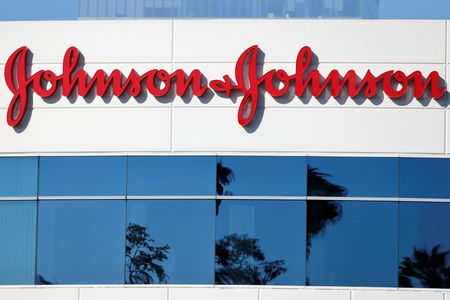By Bhanvi Satija and Patrick Wingrove
(Reuters) -Johnson & Johnson on Thursday expressed optimism for strong growth this year, saying it expected to surpass profit estimates with joint replacement and other surgeries rebounding after COVID-19 and inflation tempering, as its shares rose 6%.
J&J also told investors it was banking on strong demand for its cancer drugs, with protections in place for its blockbuster arthritis drug also bolstering its pharmaceutical portfolio.
Shares of the healthcare conglomerate were up 6.2% in midday trade to $168.61. Shares of other medical device makers such as Medtronic and Abbott Laboratories, which also posted upbeat results, gained more than 3%.
J&J said it now expects adjusted 2023 profit of $10.70 to $10.80 per share, above estimates of $10.65 per share and its prior forecast of $10.60 to $10.70 per share.
The drug and device maker also posted better-than-expected second-quarter earnings of $2.80 per share, compared with analysts’ expectations of $2.62.
It had been “responsibly cautious” in its guidance earlier this year, but growth across the business gave J&J confidence to raise its full-year outlook, Chief Financial Officer Joseph Wolk told Reuters.
“The qualifiers are now off, and if you look across our entire portfolio — just strength across the board,” Wolk said in an interview, noting that despite concerns last quarter, inflation had steadied.
J&J is trying to bolster growth at its pandemic-hit medical devices business while placing huge bets on its newer cancer drugs and seeking to counter a potential slowdown in sales of its Stelara arthritis drug when biosimilars hit as soon as 2025.
Second-quarter sales for the company’s medical device unit were $7.79 billion, topping estimates of $7.55 billion.
The volume of procedures such as hip and knee replacements and medical staffing levels needed to deliver them were expected to be “stable” for the rest of the year, J&J said after COVID-19 delayed surgeries and triggered healthcare worker shortages.
J&J’s medical device unit’s performance is a positive early indicator of what’s ahead for other companies in the sector, Stifel analyst Rick Wise said in a note.
The company said it expects pharmaceutical sales to grow more in the second half of 2023.
Wolk told Reuters that J&J’s patent litigation settlement with Amgen <AMGN.O> over arthritis drug Stelara, which met expectations with sales of $2.8 billion in the second quarter, boosted confidence about hitting its target of $57 billion in pharmaceuticals sales by 2025.
J&J has also settled with Alvotech and Teva Pharmaceutical over their version of Stelara, delaying any competition until 2025, with company executive Erik Haas telling investors no other biosimilars were expected before then.
Quarterly sales of its multiple myeloma drug, Darzalex, also met Wall Street estimates at $2.43 billion, Refinitiv data showed.
Meanwhile, J&J said it would continue efforts to separate from its consumer health unit Kenvue, which sells popular self-care and skincare brands such as Tylenol and Neutrogena and went public in May.
J&J will “split off” its shares of Kenvue through an exchange offer as part of its separation plan that Wolk said “effectively enables us without a significant cash outlay to potentially acquire a number of shares.” It currently holds about a 90% stake, according to Refinitiv.
Haas, J&J’s vice president for litigation, also told investors it will “aggressively” defend itself amid ongoing proceedings over its talc products, including its Baby Powder, amid ongoing lawsuits and bankruptcy proceedings for its related subsidiary.
J&J is facing more than 38,000 lawsuits alleging the products were contaminated by asbestos and caused cancer, claims it has denied. It is attempting to resolve the issue through an $8.9 billion settlement in bankruptcy court for the second time.
(Reporting by Bhanvi Satija in Bengaluru and Patrick Wingrove in New York; Editing by Anil D’Silva, Mike Harrison and Susan Heavey)

